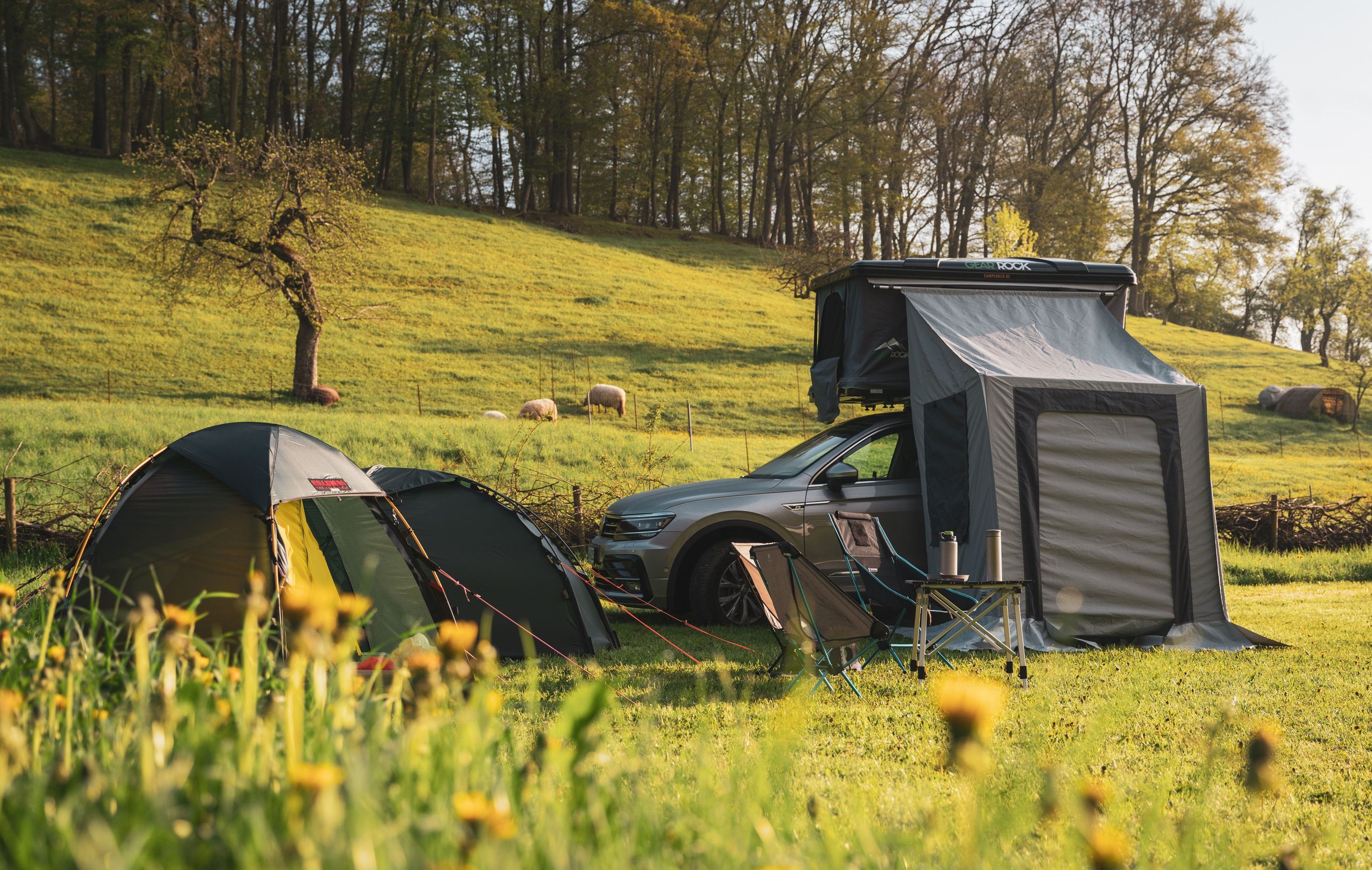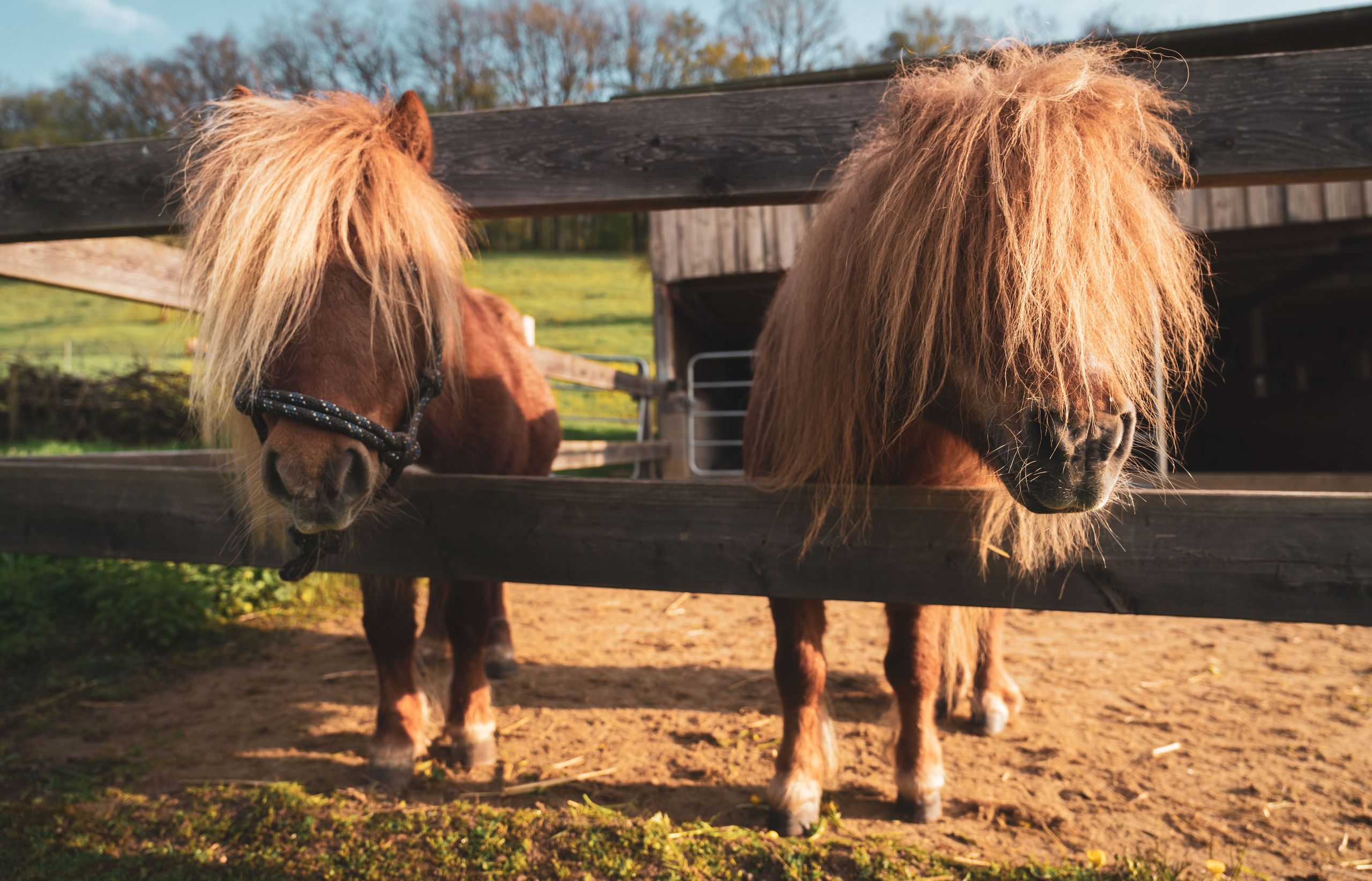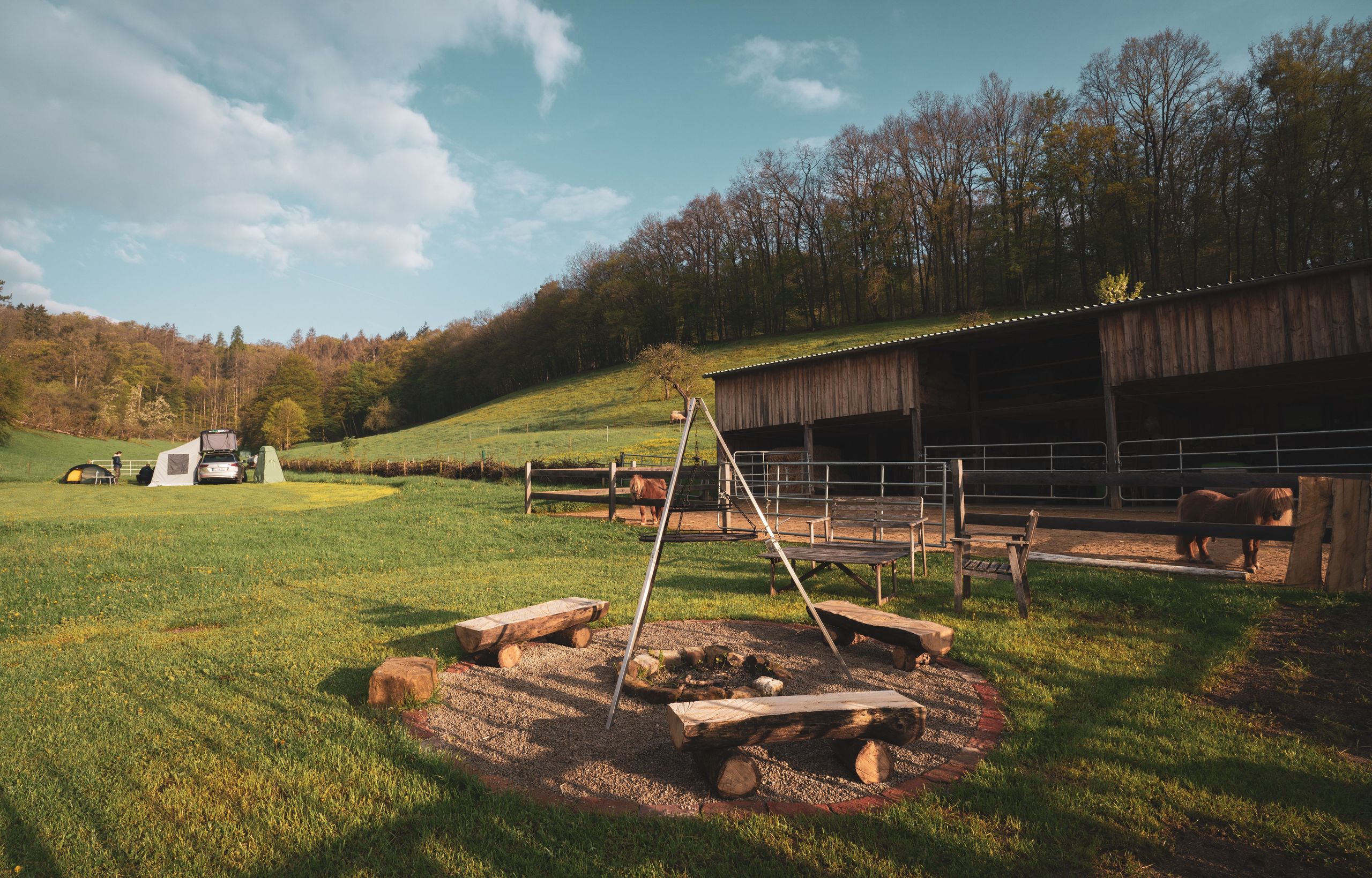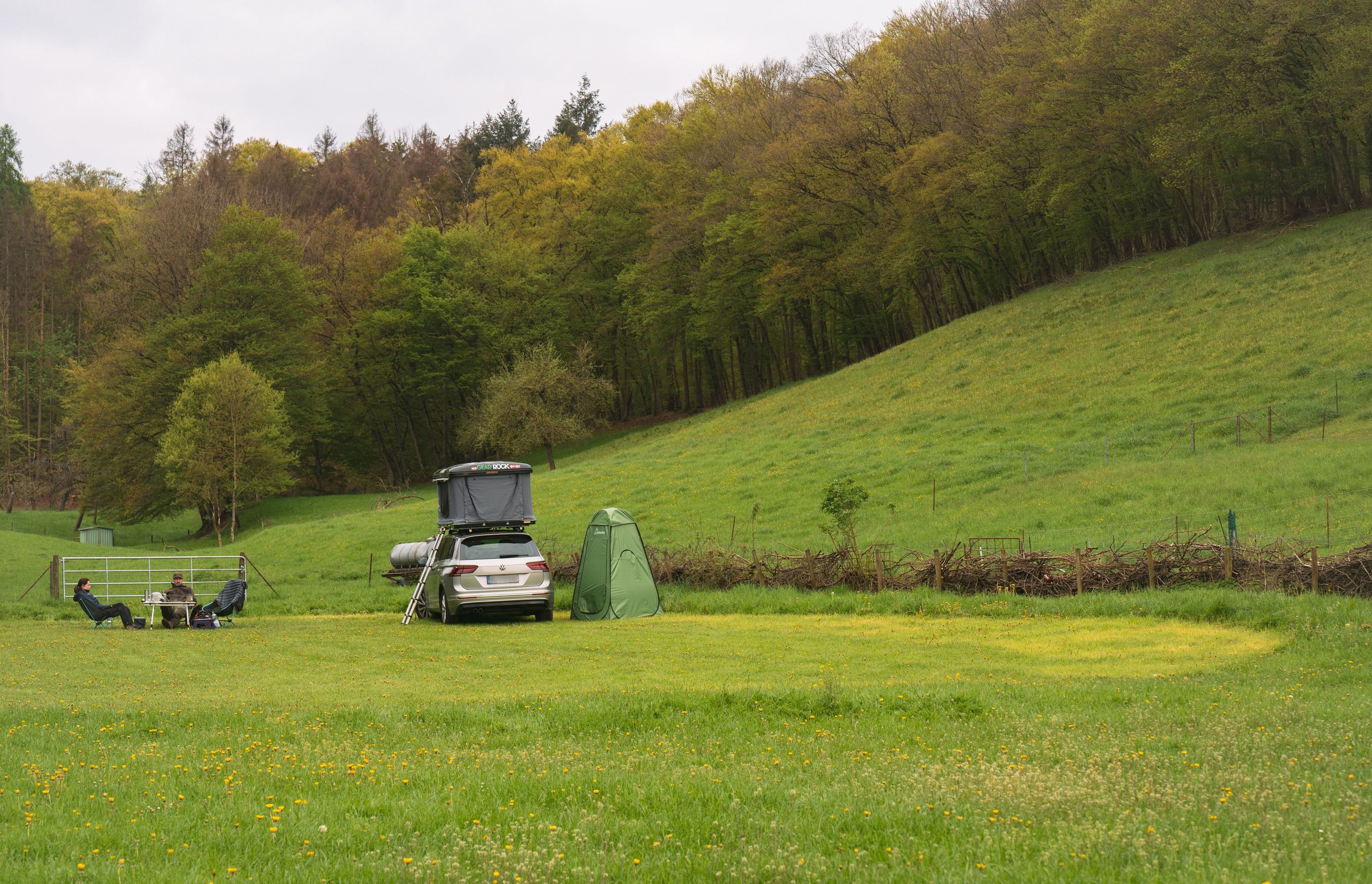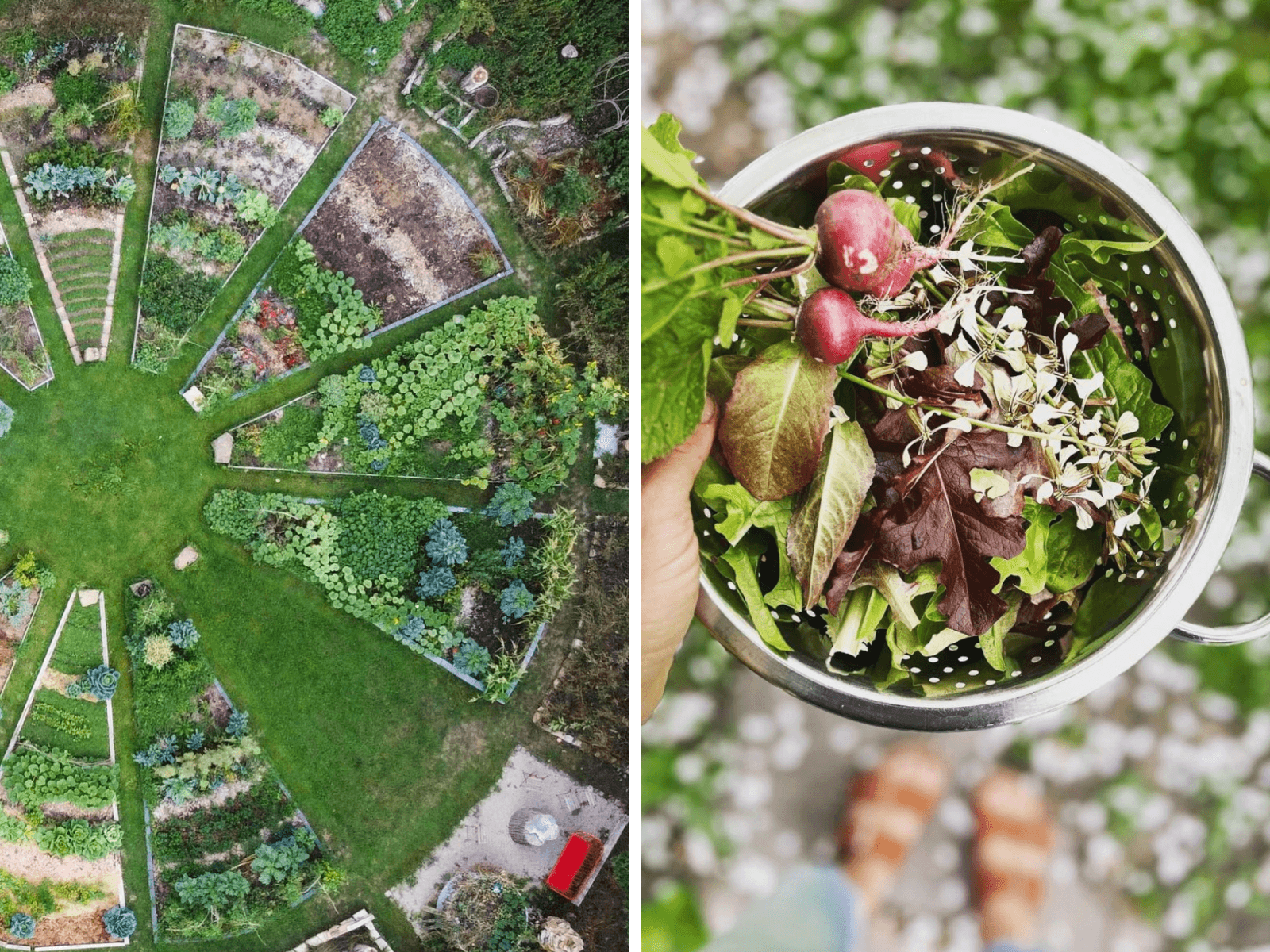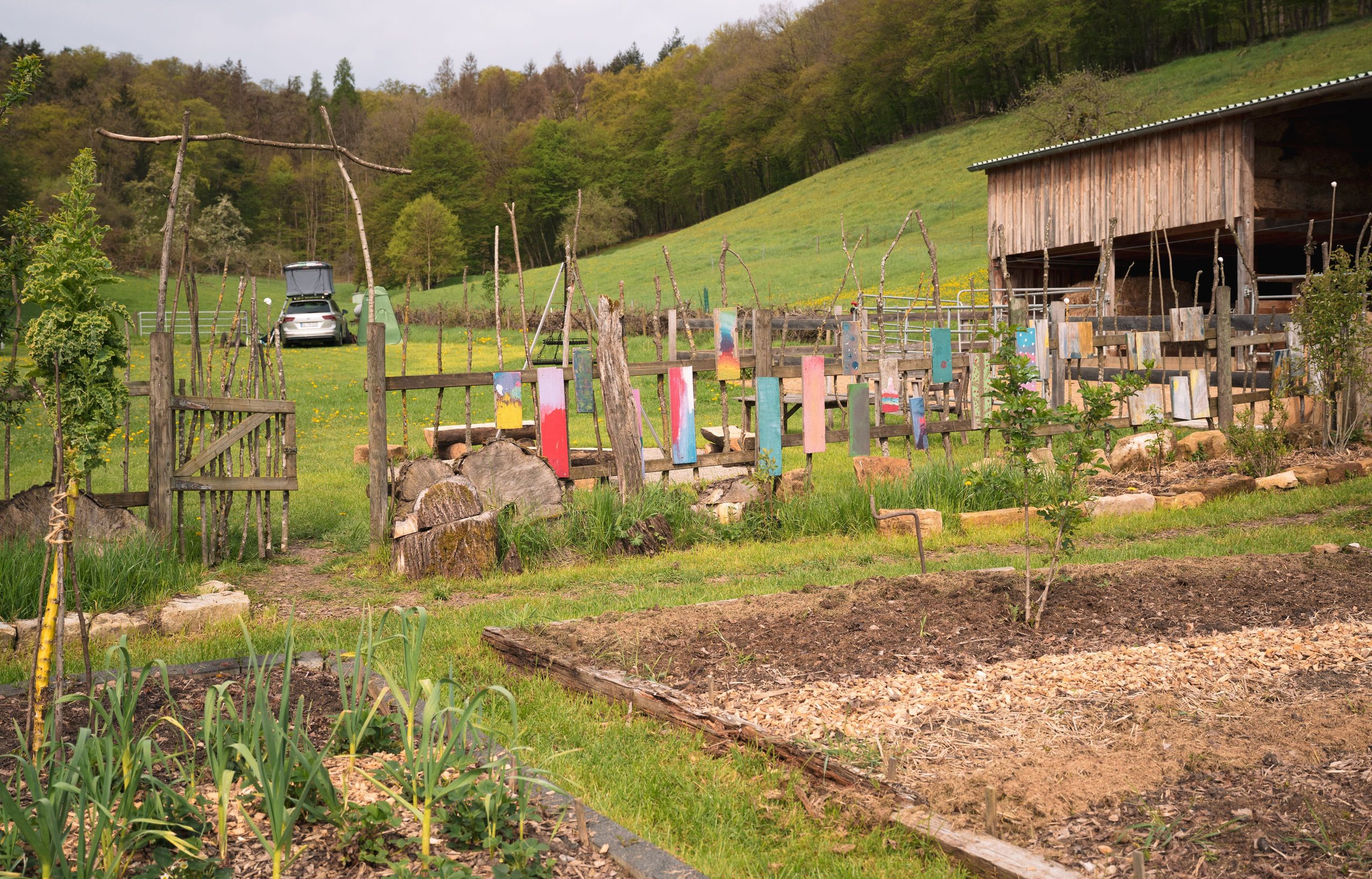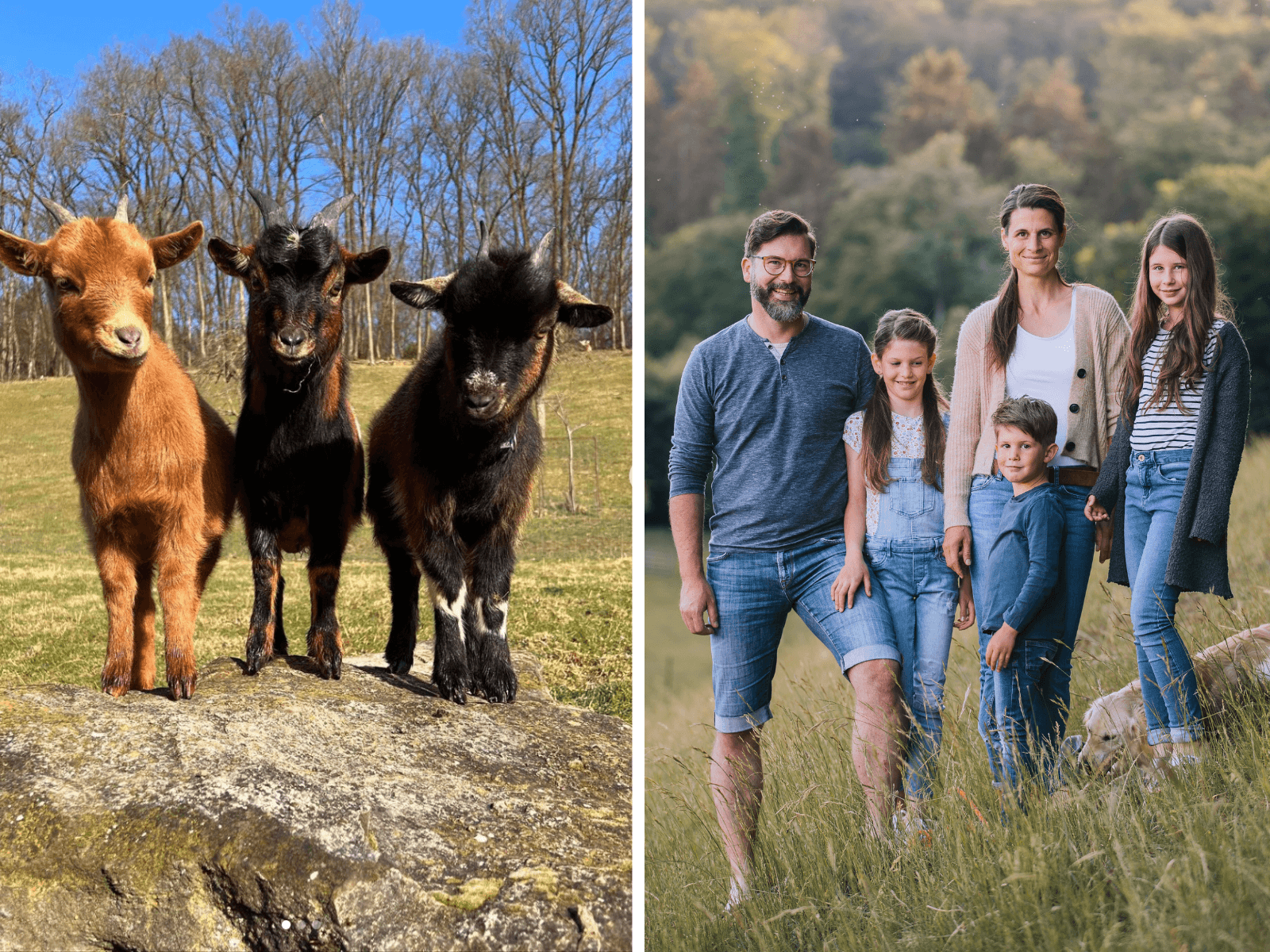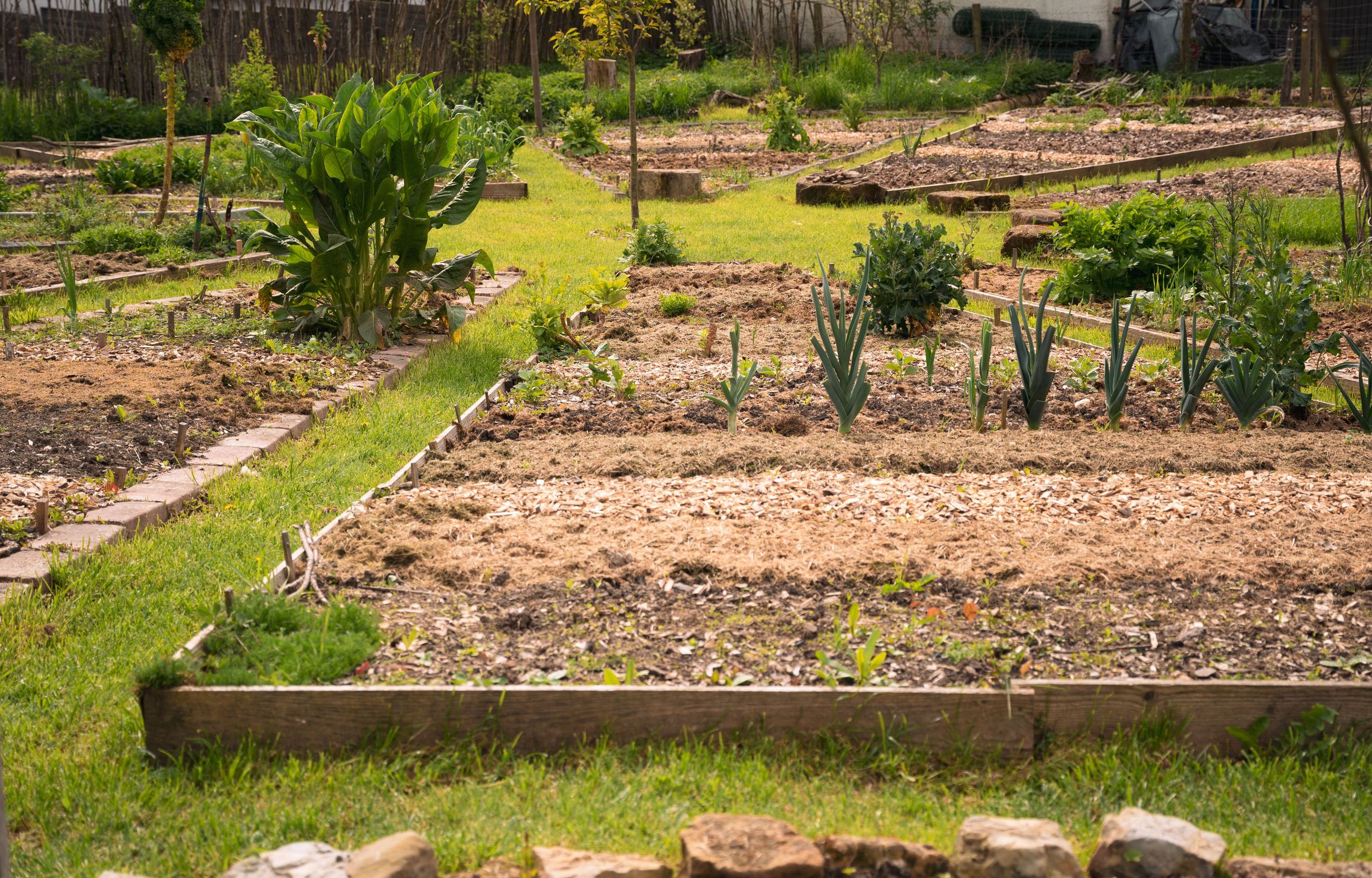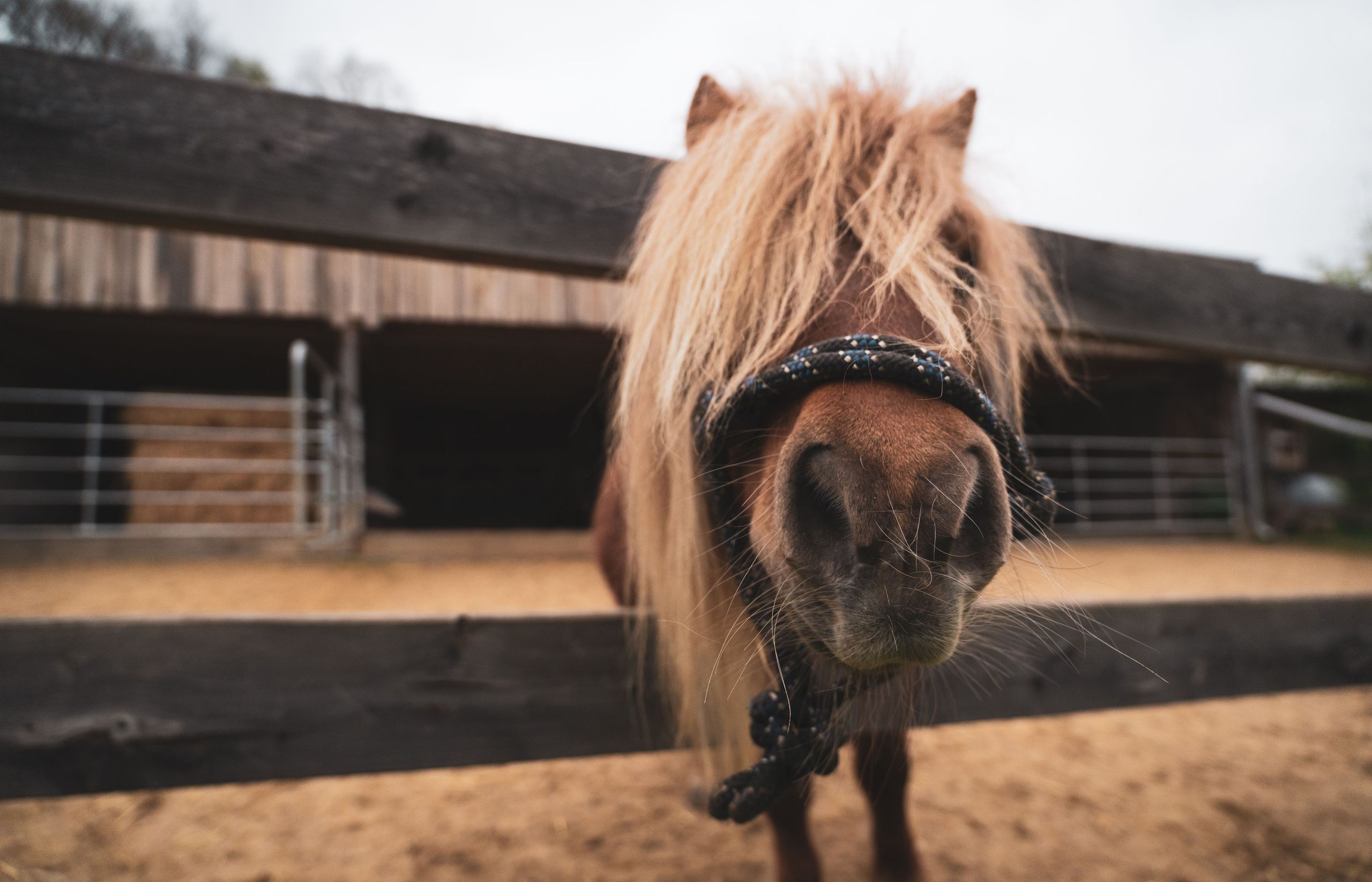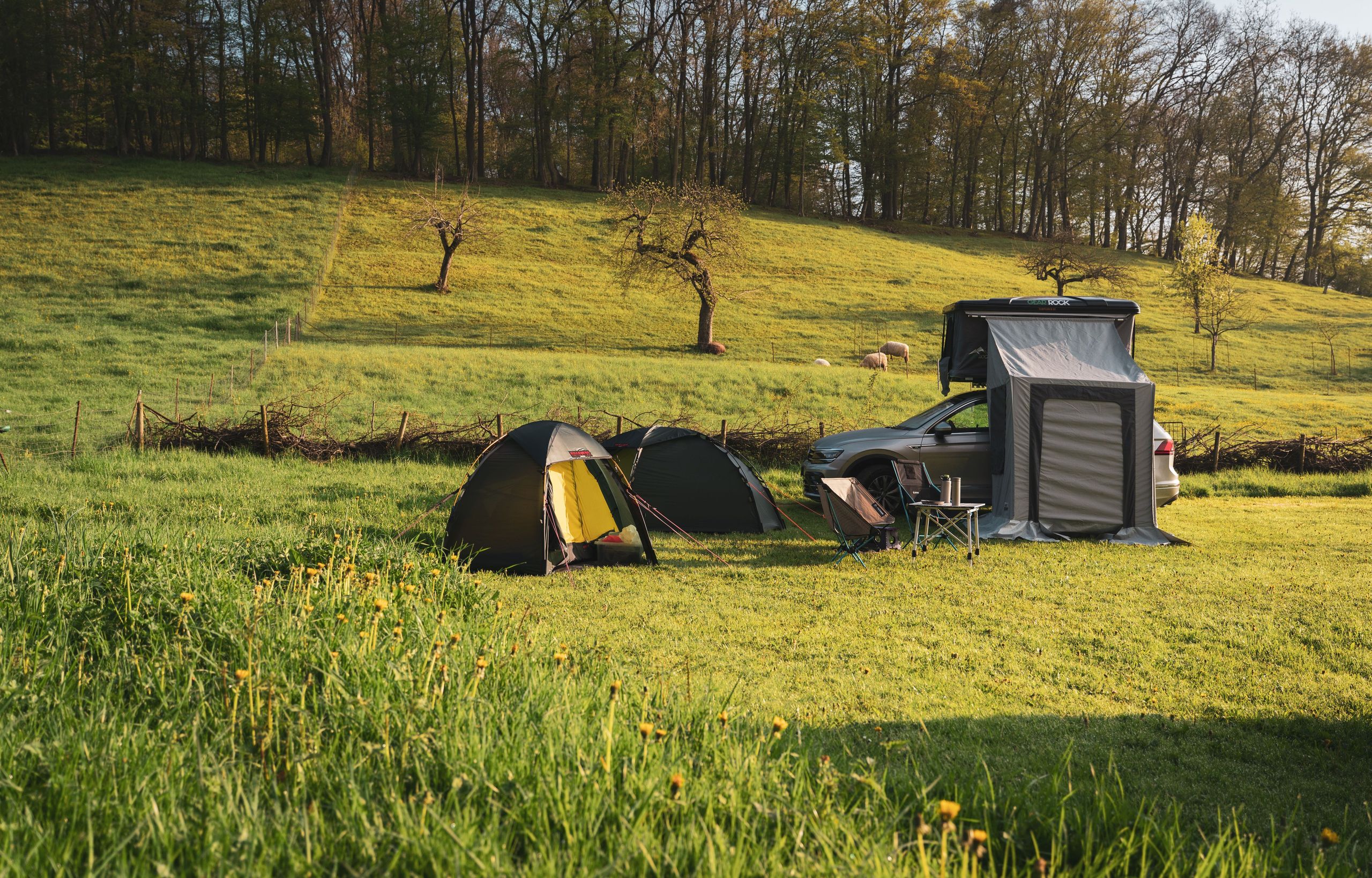The seeds of sustainability: Exploring a self-sufficient farm
Jun 5, 2023from Lesley-Ann Jahn
Our Hinterland hosts Miriam and Christian about their mandala garden, modern country life and why it's so easy to find peace and quiet at their camp.
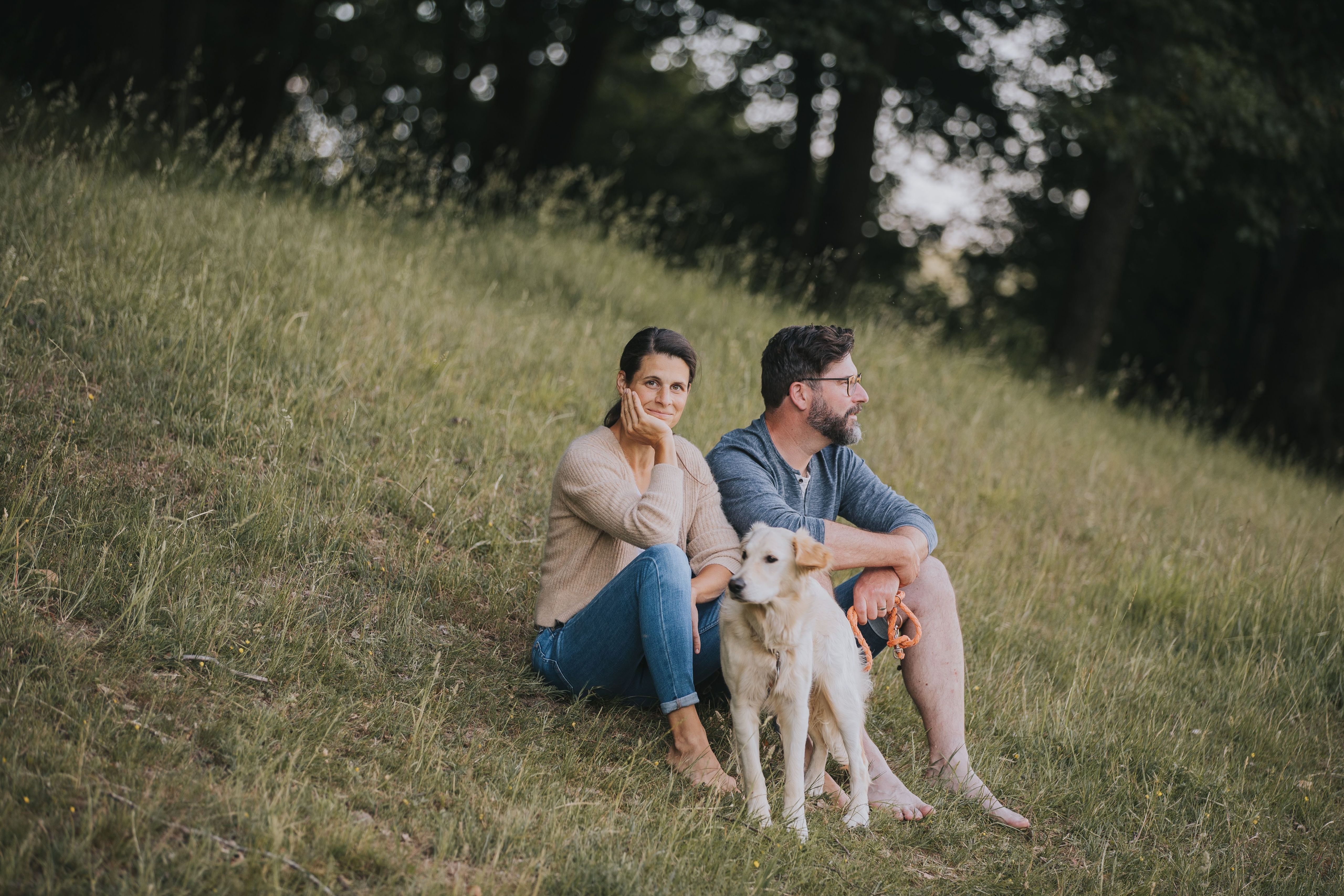
From a vibrant pantry filled with homegrown fruits and vegetables to the warm embrace of wool from their beloved flock of sheep, the Nathem family thrives on the abundance of their own garden. Yet, describing their sanctuary as a mere "garden" would be an understatement, for their expansive property boasts a permaculture haven and a delightful petting zoo. As cherished Hinterland hosts for over two years, they have graciously shared their slice of paradise in the southern Eifel and their daily farm life with guests. In our conversation with them, we explore the joys of self-sufficiency and delve into the secrets behind finding true serenity at their camp.
Your Hinterland Camp here in the southern Eifel is really something special. How did you get the great property and the farm?
Miriam: The house we live in is Christian's parents' house. It included a small area on the hillside with plum and apple trees. For grazing, Christian's grandfather kept sheep here many years ago. After graduation we moved into the basement apartment. At first we had only a cat and rabbits. As chance would have it, we fell in love with two goat kids at a livestock market. Lisbeth and Mariechen. For our wedding we got chickens as a present and when our daughters turned out to be as big horse lovers as we were, our two shettys Zazou and Mücke moved in.
Christian: With all the animals, the need for space naturally increased. The farmer who owned the adjacent land was kind enough to accommodate us and we were allowed to buy the pastures. With the birth of our son and the acquisition of a small herd of dwarf cattle, it was of course clear that a mini-farm should not be without a real old tractor, which in turn needed a shelter. So we built another shed and took even more space. The desire for a larger garden for self-sufficiency with vegetables we had for a long time - in the first Corona lockdown we then created our mandala garden. Finally, we found the cherry on the icing in our retriever dog Juna. In the meantime, we are farmers on the side and joke with the neighbors that probably one day an elephant will move in.
What inspired you to make what you call a "nature experience farm” out of your property and to share your life here with guests?
Christian: The idea of a nature experie farm was born together with the garden during the lockdown. We found the surrounding nature, the coexistence with the animals and the possibilities that our land offers so pleasant and liberating that we wanted to share this wonderful place with its unique, idyllic location in the valley on the outskirts of the village with other people.
... in any case, you have already made many Hinterland guests happy, who were allowed to camp here!
Miriam: For us it is always nice to see how most guests get out after arriving here, take a deep breath and marvel at how beautiful it is. So often we have heard what a special place we are allowed to live in, and that is exactly how we feel ourselves. You forget all your worries in an instant when you wander through the garden, the meadows or the forest, sit at the edge of the forest and enjoy the view or cuddle the animals or just watch them. Many visitors have already described our farm as a healing place. And we feel the same way. Here you automatically come to rest.
What do you particularly appreciate about being a host at Hinterland?
Miriam: There is a nice saying in German: "Happiness doubles when you share it". That sums up the situation here quite well. We like to let people share in our life in the countryside and show that you can be very happy in the simplest of ways without frills and fuss. We also really enjoy meeting new people. Most of the campers who find their way to us are consciously looking for peace and quiet and a connection to nature, and are thus like-minded or at least similar. You quickly get into a nice exchange. And our kids are always happy to have playmates of the same age with them. Real friendships have already developed, and we have enjoyed a beer or two around the campfire with some of the visitors.
Besides the relaxing moments that you and Hinterland guests experience here, I can imagine that living self-sufficient involves a lot of work, right?
Miriam: Definitely. One should realize: to provide oneself with vegetables and meat, eggs, wood, wool, etc., partly or all year round, requires both diligence and interest in many different things. And also manual skills. But we don't really see the work as work, we enjoy doing it and learning new skills. So we don't mind shelling peas until late in the evening, boiling vegetables, hunting snails with a headlamp and on all fours, or catching the runaway cattle on Sunday night. You get a completely different relationship to many things. You suddenly recognize their value, become humble, and also realize that you can do without a lot. If I had to name three learnings, they would probably be these:
- Just do it! Put your hands in the ground and let's go.
- Be open for everything that comes. Trust in nature and also have a lot of patience. Most problems turn out not to be a problem after all, or they solve themselves at some point. This is a wonderful exercise for life in general.
- Gather your own experiences. In your own garden and with your own animals. Other people can tell you a lot, but every garden and every animal is different and wants to be managed and kept in its very own way. There are no instructions, you are allowed to be and remain experimental.
What does a typical day on the farm look like for you?
Miriam: Since Christian is on the road a lot for work, I am mainly responsible for taking care of the animals and plants during the week. When everyone is out of the house, I take Juna for a big dog walk through the surrounding meadows and forest. The way back usually leads across our grounds, so that I can feed all the animals and provide them with fresh water, and also check whether they are all doing well. Afterward my way usually leads to the garden, especially now in summer there is a lot of work to do, because all the young plants are allowed to move into the beds. In winter, when the garden requires less attention, I work on new ideas for our farm and their implementation.
After work, Christian is also drawn to the outdoors, and we implement projects together or lend each other a hand with various jobs. And our three children also like to lend a hand after school, each with their own areas of responsibility and specialties. But the best time is on the weekend, when we all scurry around outside together.
What are your absolute favorite vegetables - perhaps also special ones - that you grow on the farm?
Miriam: Everyone here has their favorites! I could hardly do without my own tomatoes, one daughter can be found in the cherry tree, the other in the strawberry patch, the son prefers fresh peas, Christian can't decide and likes to eat everything :D The dog loves crunchy carrots, the goats and sheep are more into fallen fruit. We generally make sure that we continue to breed old varieties and thus preserve them.
What motivates you most to get up every day and run the farm and garden? Miriam: The joy of doing. Physical work and manual labor have always been fun for me. We are rewarded with aromatic, fresh organic vegetables. The thought of the colorful, full pantry, where summer laughs at us in a jar when we enter in winter, drives me on even more. Last but not least, the love for all our animals that I get to take care of. After a childhood without animals, there is nothing better for me than to sit with the horses in the hay and listen to their cozy chewing. Or to feel how the goats delicately take the food from my hand. Or to race with our dog. Or watching the chickens meditatively and quietly cooing as they peck contentedly in the meadow. We are very happy and grateful that our three "little ones" are allowed to grow up like this.
Christian: Of course, not everything is always so dreamlike here. Animals are also sometimes sick or die. The young plants we have painstakingly grown ourselves are completely destroyed by snails in just one night. That also brings us down. But the bottom line is that you already know in the morning that you will have accomplished a lot in the evening and will plop contentedly into bed. So if that's not motivating!
I'm sure many people envy your way of life and long for a similar connection to nature in their everyday lives. Do you think that living in the countryside and being self-sufficient will become more popular (again) in the future?
Christian: Due to digitalization and the increasing possibilities to work in a home office, living in the countryside will certainly become more attractive again for many people. Self-sufficiency is a great thing and quite easy to implement on a small scale. We would very much like to be able to inspire more people to do this in the coming years. However, complete self-sufficiency with vegetables and meat throughout the year requires diligence and stamina and is a full-time job. The willingness to make sacrifices, such as foregoing long vacations several times a year, and to show commitment, is unfortunately currently lacking in society in our eyes.
Miriam: Our dream is indeed that - as in the past - every family would again have so much space around the house to grow their own vegetables and keep animals for dairy and meat products. And that these home-grown products could also be used as a means of exchange, for example for handicraft work. Admittedly, this is a very old-fashioned and romantic fantasy that will never be realized. But many people would certainly be a lot happier than they are today.
What else do you have planned for the future on the farm?
Miriam: The expansion of our currently not so pretty blue container to a Tiny house is at the top of the to-do list! The cooperation with a school for impaired children is currently underway - one or two school classes visit us weekly, we garden together, learn a lot about dealing with animals and come together in nature to observe and rest. On the plan is in any case also to complete the small circular trail around our entire site, which leads partly through the sheep and goat pasture, past beautiful vantage points and small picnic areas and with slack line, swings and earth slides in the forest for young and young at heart lots of fun. An earth cellar for optimal storage of vegetables and fruit in winter, and a clay oven to finally bake your own perfect bread are small dreams that may also come true someday. In any case, we won't run out of ideas anytime soon.
You can find more information about the self-catering and nature experience farm on Instagram. Photos: private, Melanie Keller
